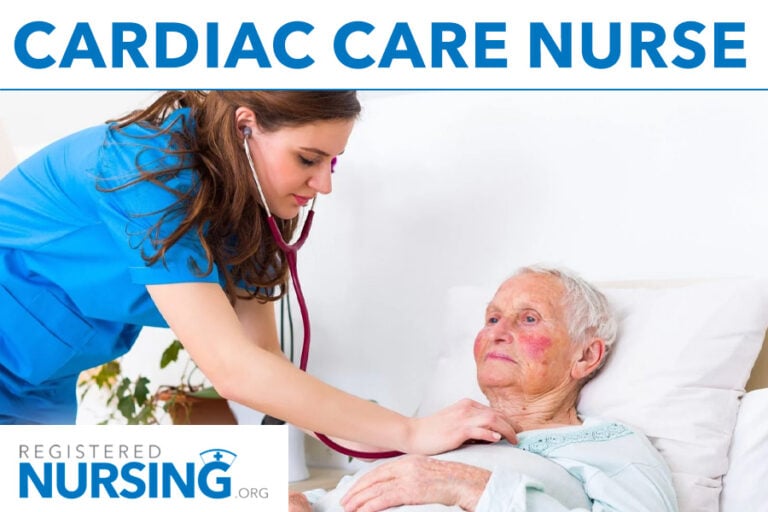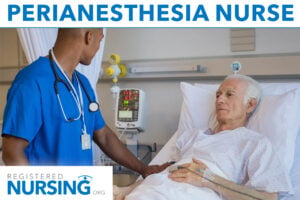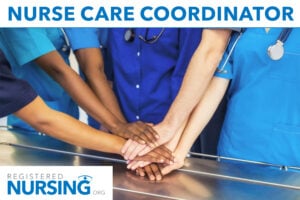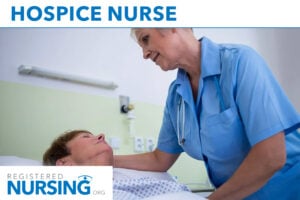Cardiac Care/Cardiology Nurse

What is a Cardiac Care/Cardiology Nurse?
Cardiac care/cardiology nurses treat and care for patients with a variety of heart diseases or conditions. This can include patients suffering from coronary artery disease or congestive heart failure, or those recovering from angioplasty or bypass surgery. Cardiac care/cardiology nurses monitor the hearts of patients of all ages and may help administer heart medications and perform stress-test evaluations on a regular basis, or take care of more urgent heart issues, such as assisting in defibrillation. This type of nurse works closely with cardiologists to expedite quality care for heart patients.
How to Become a Cardiac Care Nurse
RNs who want to go into cardiac care nursing must first gain some hands-on experience. Nurses with a clinical care background are well poised to enter cardiac care, as they typically have experience handling acute injuries and illnesses. A medical-surgical or OR background is also helpful, as many cardiac care/cardiology nurses look after patients who have just gone through heart surgery. Communication skills are also a big part of the cardiac care/cardiology nurse's job, as situations can be urgent and miscommunication between the patient and the care team could cause major problems.
What Are the Schooling Requirements for Cardiac Care Nurses?
The minimum education requirement to become a cardiac care nurse is an ADN, although many hospitals prefer at least a BSN. Nurses must also take and pass the NCLEX-RN and hold an active license. To advance and become a Cardiology Nurse Practitioner, an MSN should be pursued by applying to graduate schools. RNs interested in being long-term cardiac care nurses should also gain experience so that they can become certified.
Are Any Certifications or Credentials Needed?
There are a few certifications that cardiac care/cardiology nurses can receive. The first is an RN-BC via the Cardiac-Vascular Nursing Certification. To be eligible for this certification, an RN must have practiced nursing full-time for at least two years, have a minimum of 2,000 hours of clinical practice in cardiac-vascular nursing within the last three years, and have completed 30 hours of continuing education in cardiac-vascular nursing within the last three years. Most hospitals also want their hires to be certified in Basic Life Support and Advanced Cardiac Life Support as well.
| Certification | Full Name | Length of Certification | Key Differences |
| CCRN (Adult) | Critical Care Registered Nurse (Adult) | 3 years | Focuses on the care of critically ill adult patients, including those with cardiac conditions; requires experience in critical care. |
| CSC | Cardiac Surgery Certification | 3 years | Specialized in caring for patients recovering from cardiac surgery; requires experience in post-operative cardiac care. |
| CMC | Cardiac Medicine Certification | 3 years | Specializes in the care of patients with acute or chronic cardiac conditions, excluding surgery; focuses on medical management of cardiac patients. |
| CVRN | Cardiovascular Nursing Certification | 4 years | Broad certification covering various aspects of cardiovascular nursing, including prevention, treatment, and management of heart disease. |
| CEPS | Certified Electrophysiology Specialist | 3 years | Focuses on the care and management of patients with arrhythmias and other electrophysiological disorders; requires specialized knowledge in electrophysiology. |
| CHFN | Certified Heart Failure Nurse | 4 years | Specializes in the management of patients with heart failure, including education, treatment, and patient support. |
What Does a Cardiac Care Nurse Do?
Cardiac care/cardiology nurses provide ongoing care to help patients manage heart conditions, such as administering medication and performing health assessments, as well as providing post-op care to patients who are recovering from heart surgeries. They perform stress-test evaluations, monitor heart activity and electrocardiograms, and insert IV drips. Pain management post-surgery is a big part of their job, as well as helping patients manage discomfort from heart issues.
Where Do Cardiac Care Nurses Work?
Most often, cardiac care/cardiology nurses work in hospitals taking care of cardiac patients in:
- Post-op or ICU environments
- Cardiovascular centers
- Private clinics
- Home health agencies
- Nursing homes
- Correctional facilities
- Schools
- Military
What Are the Roles and Duties of a Cardiac Care Nurse?
- Perform health assessments on cardiac patients
- Administer medication
- Perform stress test evaluations
- Provide cardiac and vascular monitoring
- Treat chronic health conditions
- Monitor electrocardiogram readings
- Provide post-op care following bypasses, pacemaker implants, and other heart surgeries
- Insert and remove IV drips
- Monitor use of a defibrillator
- Work alongside cardiologists and surgeons to provide cardiac care
Cardiac Care Nurse Salary & Employment
Cardiac care nurses can earn between $78,466 and $96,381 annually. The median salary for a cardiac care/cardiology nurse is $87,630 per year. This salary fluctuates based on location, place of employment, and the RN's experience level. Advanced cardiac care nurses who hold an MSN can expect to earn at the top of the pay range. If you’re looking for the highest-paying cities for cardiac care/cardiology nurse salaries, look no further than California, where the top 8 cities for cardiac care nurse pay:
| City | Average Yearly Salary |
| San Jose, CA | $109,976 |
| Santa Clara, CA | $109,976 |
| Fremont, CA | $109,801 |
| Daly City, CA | $109,538 |
| San Francisco, CA | $109,538 |
| Oakland, CA | $106,909 |
| Berkley, CA | $106,909 |
| Hayward, CA | $106,734 |
With many Americans suffering from heart conditions, and with heart disease being one of the leading causes of death in the country, cardiac care nurses are in demand. Employment in this specialty is projected to grow steadily, making it a stable career path for RNs.
Cardiac Nurse FAQs
Pediatric cardiac care nurses care for infants and children with cardiac and congenital heart disease. Their role involves collaborating with other members of the health care team to provide specialized care, from admission to discharge. This includes supporting the patient and family during all stages of diagnosis and treatment.
Pediatric cardiac care nurses are often employed in specialty pediatric clinics and children’s hospitals. In the hospital setting, they may work on inpatient cardiac units, in the cardiac catheterization lab, operating room, or on the cardiovascular intensive care unit. They receive continued education, training, and support to provide evidence-based care to the pediatric population.
The cardiac care nurse and cardiac catheterization laboratory nurse both require advanced knowledge of the different heart rhythms. In both roles, you are required to use electrocardiography equipment frequently.
A cardiac care nurse provides direct care to the cardiac patient population and assists in the treatment of a variety of complex cardiac diagnoses. Responsibilities include caring for patients, both pre and post-cardiac surgery. They also provide care to patients experiencing moderate to severe symptoms related to cardiac disease.
A cardiac catheterization laboratory nurse assists with the different cardiac procedures in the cath lab, ranging from basic diagnostic procedures to more complex interventions. Responsibilities include pre-op preparation of the patient, along with recovering patients directly after their procedures. They also provide education to the patient and family members regarding their treatment plan.
Helpful Organizations, Societies, and Agencies
- Preventive Cardiovascular Nurses Association
- American Board of Cardiovascular Medicine
- The Society of Pediatric Cardiovascular Nurses
- Journal of Cardiovascular Nursing
- European Journal of Cardiovascular Nursing








